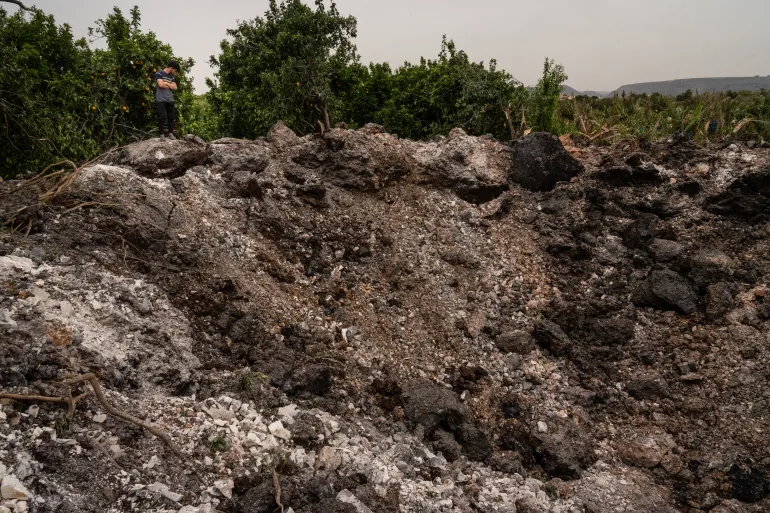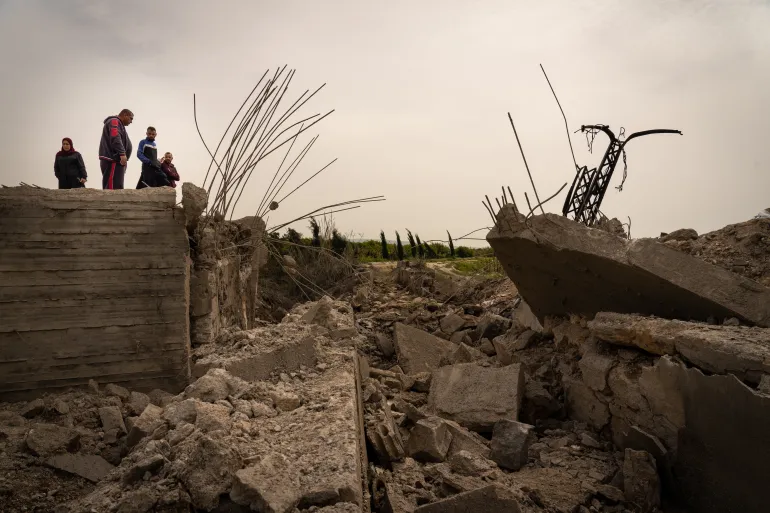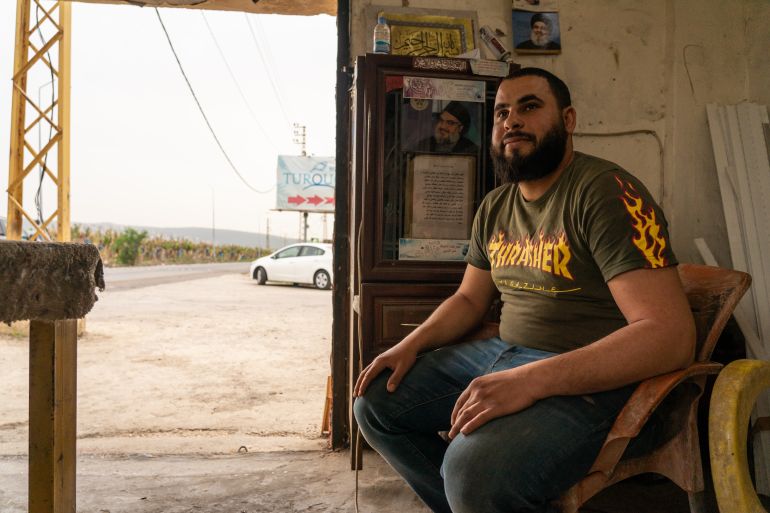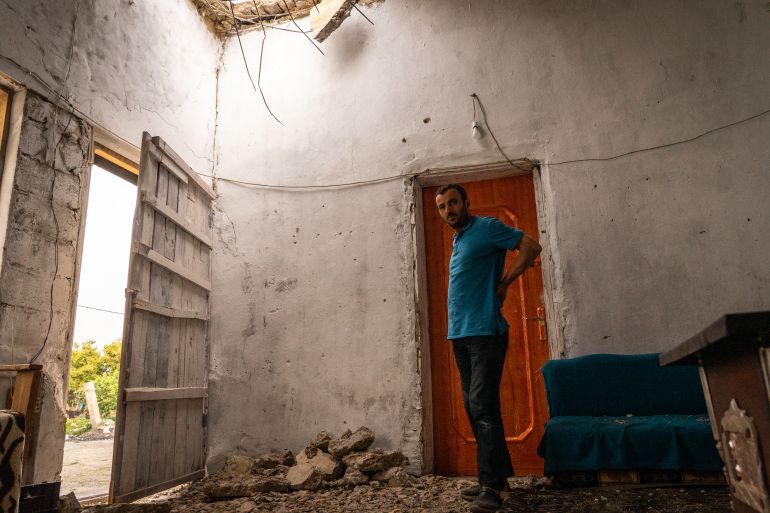After cross-border violence, South Lebanon residents worry about a larger conflict with Israel.
Lebanon’s Qlaileh – Abdelkhaliq Abdelsattar and his family, Idlib-based Syrians, were abruptly awakened on Friday by the sound of an Israeli warplane bombing Tyre in southern Lebanon.
Abdelsattar, who was familiar with the noises of battle, fled the house with his wife and seven children after hearing a second explosion close by just before a third missile went off, sending what he described as a boulder the size of a cow through their bedroom’s roof.
“My kids had a mental breakdown, they haven’t slept, and they are still terrified. While sitting in his destroyed home, where the family’s mattresses and carpets are covered in debris, Abdelsattar tells Al Jazeera that although they have been in the Syrian war, they have never been in a scenario like this.
Blue plastic sheets now cover the windows, and light and wind stream in through the hole in the roof, exposing iron rebar that sags to the ground.
He claims, “A miracle saved us.

The crater left by Israel’s attack in southern Lebanon last week is where Abdelsattar’s kid is standing. (Mia Alberti/Al Jazeera)
Israel, Hezbollah, and Hamas
In response to Israel’s attack on the Al-Aqsa Mosque compound in Jerusalem, 34 rockets were shot in its direction on Thursday from a place just a few kilometres from the Lebanese border. This prompted Israel to launch its air campaign on Friday.
The Palestinian militant organization Hamas, which controls the Gaza Strip and has a wing in Lebanon, was blamed by the Israeli army, which said it carried out the attacks on targets connected to the organization.
Although Hamas refrained from claiming responsibility for the attack, the organization said in a statement that Israel was solely to blame for the tensions between Lebanon and Gaza “and for the consequences that will bring into the region.”
The Iranian-backed Shia armed organization Hezbollah, which likewise declined to take responsibility for the attack despite controlling security in southern Lebanon, has been tasked by the Lebanese government with bringing down tensions.
Due to their shared hatred of Israel, Hamas and Hezbollah have allied in recent years, and the leadership of both organizations frequently meets in Lebanon.
Hassan Nasrallah, the leader of Hezbollah, met with Ismail Haniyeh, the director of Hamas’ political bureau, and other Hamas officials on Saturday.
With the recent incidents, Hezbollah officials reiterated Nasrallah’s earlier claim that any Israeli attack on the Al-Aqsa Mosque will “inflame the entire region.”
According to Israeli journalist Barak Ravid, reports in Israeli media stated that Israeli forces decided to target only Hamas targets in Lebanon, realizing that a “wider response against Hezbollah would likely result in the organization launching precision missiles towards Israeli cities which could escalate into a war”.
Similar sentiments were expressed by Hezbollah, which told the Al-Manar newspaper that despite this week’s violence, “the deterrent power balance remains in place.”

Israel’s attack on southern Lebanon resulted in damage to a bridge in a rural area. Al Jazeera/Mia Alberti
There is little chance of an escalation
Nobody wants a full-scale conflict since both Hezbollah and Israel are aware that no one will win in a true battle and that the casualties will be severe, according to Wimmen.
Wimmen asserts that the violence along the Israeli-Lebanese border has primarily been carried out in a barter system throughout the years since the end of the 2006 conflict and that the new incident has a negligible chance of future escalation.
Wimmen countered that it was important to recognize the severity of Thursday’s attack on Israel, the most significant since the conclusion of the war, because it increased the likelihood that Israelis would suffer deaths and necessitated a more forceful reaction.
Whoever is firing these missiles is unquestionably taking a lot more danger than in the past, according to Wimmen. “All hell breaks loose in Israel if one of those rockets hits a supermarket with customers inside. That is all it requires.
Majed and Nawal, a retired couple from Qlaileh who identify as “products of war” due to having experienced it for virtually their whole lives, are well aware of the following: The unexpected must be expected when you’re Lebanese, according to Majed.
He tells Al Jazeera, “You can’t think about what can happen because anything might happen.
The couple was one of the villagers that went to the scene of the second explosion, which also destroyed a bridge and an irrigation system in the centre of an orange farm. The loud noises of bombs bursting have been replaced with the sound of birds chirping.
Although similar incidents have occurred after the unofficial end of the war Israel started against Lebanon in 2006, this week’s episode was the most serious since that time, bringing back the local’s memories of difficult times.
“That familiar whooshing sound of the plane can be heard immediately. then bang!” Al Jazeera is told by Nawal.
They haven’t been able to sleep since Thursday’s attack; a lot of their family and friends left for Beirut as soon as they heard rockets. The couple, who survived the Lebanese Civil War and are visiting Lebanon for Ramadan, were also here when the 2006 war broke out.
“When you come to Lebanon, this is the first thing you worry about as there is no safety, there is no stability. You are always on edge, you are always expecting something like that to happen,” says Nawal.
Hezbollah’s presence in their hometown does not worry them but both Majed and Nawal say Hamas’s activities in Lebanon are harmful.
Since the strike on Thursday, they haven’t been able to sleep, and many of their family members and friends fled for Beirut as soon as they heard rockets. The pair, who are in Lebanon for Ramadan and are survivors of the Lebanese Civil War, were also present in 2006 when the conflict started.
“This is the first concern you have when you visit Lebanon since there is neither safety nor stability. You are constantly on alert and anticipating something similar to occur, claims Nawal.
They are unconcerned by Hezbollah’s presence in their community, but Majed and Nawal believe that Hamas’s operations in Lebanon are detrimental.
“We are being penalized. We seem to be pawns in a chess game; we have no idea what is going on. We simply put up with it, she says.
The Lebanese government hasn’t said much, either.
As part of its joint investigations into the incident with the United Nations peacekeeping operation in South Lebanon, the army has discovered multiple rocket launchers and projectiles in the region since the attacks (UNIFIL).
But, aside from that, the army’s options are limited.
The Lebanese military often stays out of Palestinian refugee camps in Lebanon due to a previous arrangement with the Palestinians.

Even Bou Habib acknowledged that it was “simple” for Palestinian organizations to operate in southern Lebanon.
Country of Hezbollah
But, given Hezbollah’s strong control over southern Lebanon’s security, it is improbable that several rocket launches would take place there without their knowledge.
Several Lebanese are now worried that the organisation would include the rest of the nation in a fight as a result.
The common criticism of Hezbollah, according to Wimmen, is that they have taken over and monopolised the decision over whether to wage war or not. Reality: “Like it or don’t like it.”
Large Nasrallah posters and yellow Hezbollah flags border the main road from Lebanon to Tyre. The aluminium workshop owned by Ghassan al-Tourak is decorated with the same portraits.
The 30-year-old Palestinian who was born in Lebanon resides in the Rashidyeh camp, not far from the location of Friday’s initial Israeli bombing. Despite having his windows broken, Al-Tourak told Al Jazeera that he feels safe.
With a smile and a nod towards the images on the wall, he declares, “As long as Hassan Nasrallah is here, we are not frightened.”
Many like Abdelsattar are still reeling from the shock, despite the appearance that life in Qlaileh has returned to normal.
Abdelsattar points out the location of the bomb that almost killed him and his family as he makes his way through the orange orchard behind his home.
Damage to the grove’s 55 hectares (136 acres) has left crushed oranges all over the ground, filling the air with their pleasant scent. On the ground are hundreds of dead bees, some of which are still twitching from the hives Abdelsattar maintains. The rocket even unearthed dozens of potatoes, according to Abdelsattar.
When Abdelsattar and his son stand by the deep crater, the oranges and greens are replaced by upturned soil, damaged buildings, and dust closer to the explosion site.
Yet, the Syrian farmer claims he will remain here since he lacks the funds to either repair his destroyed property or relocate.
“I escaped the Syrian civil war. I didn’t pass away there or here. I have a new life because of God,” he says.
